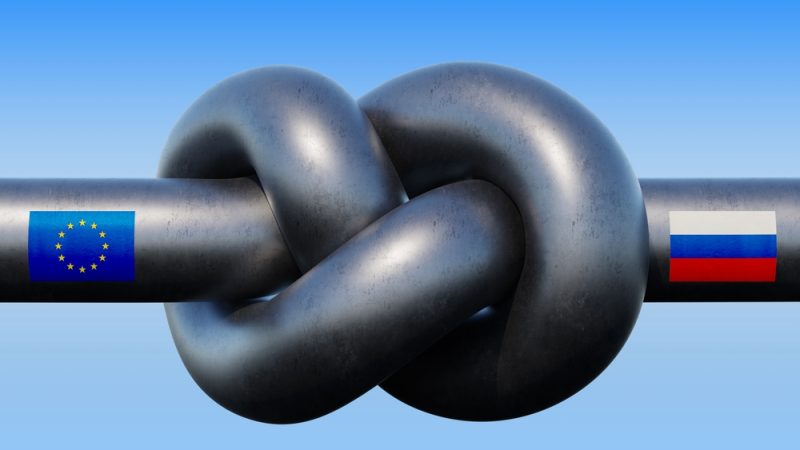« Maybe an oil embargo, if there is no way to avoid it, but, please, definitely no gas embargo » – this seems to be a widespread opinion. An oil embargo is now being discussed in concrete terms by the EU, albeit painstakingly and without any certain outcome.
In contrast, a front of resistance has formed, especially in Germany, against a rapid exit from Russian natural gas.
As the debate over an EU oil embargo against Russia drags on, opposition to a gas embargo has again made headlines in recent days. The trigger is a new study by Tom Krebs, an economics professor at the University of Mannheim, which presents the consequences of an abrupt gas embargo much more drastically than other experts.
Earlier studies forecasted a sensitive, but overall manageable economic slump in the event of an immediate suspension of all Russian oil and gas supplies.
This is the tenor of Bachmann et al., the DIW, the Leopoldina and the Deutsche Bundesbank. In his new study, Krebs predicts that, in the best case, there will « only » be a noticeable recession.
In the worst case, however, he fears an economic crisis « the likes of which (West) Germany has not experienced since World War II. » Depending on the scenario, supply shortages and higher energy prices would cause German economic output to slump by 3.2 to 12 percent. The press release on the study warns that an abrupt end to gas supplies from Russia « currently poses a high economic risk. »
The question of how a supply stop of Russian gas would affect the German economy is « probably the most prominent and relevant scientific dispute after Russia’s attack on Ukraine » according to a report in the Tagesspiegel Background. The report quotes economic expert Veronika Grimm as saying that the new study « once again confirms the high dependence on Russian gas as well as the great uncertainty about the effects of a supply suspension. »
However, Grimm says, in Germany « the possibility to react flexibly to shortages is probably greater, possibly significantly greater » than assumed in the study on the basis of a comparison with Japan’s Fukushima disaster, which was of a different nature.
It is to its credit that the new study from Mannheim highlights the risks that could arise in the worst-case scenario.
These risks are particularly great if European governments fail to respond flexibly and appropriately to shortages resulting from the interruption of Russian gas supplies.
It should be noted that a Russian supply suspension can be – as the study states – « either the result of an import embargo by the European Union or a decision by Russia (export embargo). »
Either way, Germany and Europe must prepare for a supply stop. However, Krebs’ study does not address the question of how to deal with the associated risks.
Likewise, the study explicitly does not consider the economic and political benefits of a natural gas embargo. Rather, the study focuses exclusively on the costs and risks.
Krebs claims the benefit analysis of such an embargo would « go beyond the scope of the present study » and is « therefore not carried out. » Such a limitation is legitimate for a scientific study.
In political decision-making, however, the situation is different. Here, narrowing the field of vision to specific effects of a given option must be avoided.
Yet this is precisely the problem with the political discussion about a Russian gas embargo in parts of Europe: The focus remains almost exclusively on the immediate costs and risks for the national economies.
In contrast, there is hardly any well-founded analysis and discussion of what can be achieved politically and economically with a ban on imports of Russian natural gas.
Some of the leading Russia experts consider a complete oil and gas embargo to be « very effective » (Andrei Illiarionov).
It would strike « at the very heart of Russian power » (Janis Kluge).
It would be « inconvenient for Europe – but devastating for Russia » (Nigel Gould-Davies). And it would « deprive Putin of the financial means to continue the war and massively weaken him domestically » (Sergei Guriyev and Oleg Itskhoki).
The view of costs and risks also remains mostly one-sided. The focus is solely on what a gas embargo would cost us and how risky it would be for our economy.
By contrast, the risks and costs we incur if we continue to import gas from Russia are largely ignored. With years of buying fossil fuels, Europe has given the Russian regime the financial leeway it needs for rearmament and military expansion. We now know how dangerous that was.
Continuing to buy Russian fossil fuels is playing with fire. As a result of the war it wages on Ukraine, the Russian regime is benefiting from massively increased oil and gas prices. Instead of emptying, the Russian war chest continues to fill. This ensures that the Kremlin has not only a political, but also a financial interest in prolonging the war.
Even without a decisive Russian breakthrough on the Ukrainian battlefields, a protracted war of attrition is causing massive human losses and economic damage on a daily basis.
Day after day, civilians are bombed, oppressed, abducted, forced to flee, tortured, raped, crippled, murdered. Infrastructure and production facilities are destroyed.
Supply chains, on which Western companies also depend, are disrupted. Machinery and products are taken away and stolen on a large scale.
Trade routes remain blocked. Collapsing grain exports herald a looming global food crisis. Last but not least, there is a danger that the war will escalate, spin out of control and spread to other countries, with economic costs taking on new dimensions.
Back to Tom Krebs: viewed in isolation, an immediate end to gas imports from Russia can probably be described as « highly risky » for the German economy.
The adjustment shock will most likely be brutal. If crisis management fails, the economic costs could pile up (even if the study’s worst-case scenario of a 12 percent drop in GDP is still far below the 21 percent economic collapse that Greece suffered in the wake of the euro crisis).
If the horror scenario that Krebs paints comes to pass, Germany and probably other European countries will indeed experience the worst economic crisis since 1945 – in line with the most severe security crisis that Europe is currently facing since World War II.
The risks should not be underestimated. On a closer look, however, the risks are not new. The real source of danger is not the gas embargo under discussion.
Rather, it was highly risky to let Europe be seduced by cheap gas prices for years and, despite all the warning signs, to maneuver ourselves into ever greater dependence on Russia.
This high-risk strategy has failed. Years of imprudence are now coming back to haunt us. The sword of Damocles of a sudden Russian supply stop is constantly hovering over Germany and other European countries.
Such a state of affairs is unworthy of a free nation and, as long as it persists, remains highly risky in economic and security terms, especially since it is all too obvious that the Russian regime is prepared to use gas as a means of exerting pressure at any time.
The current situation is also ethically unacceptable. It effectively forces Europe into being complicit with the aggressor. A gas embargo offers the opportunity to break free.

